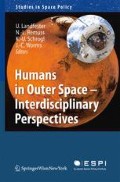Abstract
Public and political discourses are often punctuated with unfair questions. Space activities seem to attract such unfair questions — in particular by the little minds. High-spirited activities such as humans in outer space and their visions risk being ridiculed or slammed. One such unfair question is: do astronauts solve any problems on Earth? It relates to the pressing questions our societies face in times of large financial and economic crises with a credit crunch, rising unemployment and lower living standards for many people. It also relates to global problems like securing peace, saving the environment or eradicating hunger and poverty in developing countries. Is there anything less likely to be a solution to these questions than sending humans into outer space? Certainly not, to be honest. So the strategy should be to refrain from entering into such debates, which are predestined to be lost.
Access this chapter
Tax calculation will be finalised at checkout
Purchases are for personal use only
Preview
Unable to display preview. Download preview PDF.
References
Bush, George W. “A Renewed Spirit of Discovery. The President’s Vision for U.S. Space Exploration.” Jan. 2004 White House 5 Jan. 2010. http://www.ostp.gov/pdf/renewedspiritofdiscovery.pdf.
An interesting ethical approach is provided by Arnould, Jacques. La Seconde Chance d’Icare: Pour une Éthique de l’Espace. Paris: Le Cerf, 2001.
See Schrogl, Kai-Uwe and Nicola Rohner. “Für einen neuen Ansatz zur Begründung der Raumfahrt.” Die Zukunft der Raumfahrt — Ihr Nutzen und Ihr Wert. Eds. Gethmann, Carl Friedrich, Nicola Rohner and Kai-Uwe Schrogl. Bad Neuenahr-Ahrweiler: Europäische Akademie GmbH, 2007: 139–142.
For a special view on this question see: Baum, Seth D. “Cost-Benefit Analysis of Space Exploration: Some Ethical Considerations.” Space Policy 25.2 (2009): 75–80.
An exemplary expression of this leadership is contained in the book by former Moon astronaut and Senator Schmitt, Harrison H. Return to the Moon. Exploration, Enterprise, and Energy in the Human Settlement of Space. New York: Copernicus Books, 2006.
See Hansel, Mischa. “The Political Dimension of Europe’s New Spaceflight Capabilities.” Yearbook on Space Policy 2007/2008: From Policies to Programmes. Eds. Kai-Uwe Schrogl, Nicolas Peter, Charlotte Mathieu. Vienna: SpringerWienNewYork, 2009: 188–195.
See Worms, Jean-Claude. “Exploration — How Science finds its Way in Europe.” Yearbook on Space Policy 2007/2008: From Policies to Programmes. Eds. Kai-Uwe Schrogl, Nicolas Peter, Charlotte Mathieu. Vienna: SpringerWienNewYork, 2009: 196–209.
Codignola, Luca and Kai-Uwe Schrogl, eds. Humans in Outer Space — Interdisciplinary Odysseys. Vienna: SpringerWienNewYork, 2009.
“Vienna Vision on Humans in Outer Space.” Oct. 2007. European Space Policy Institute 5 Jan. 2010. http://www.espi.or.at/images/stories/dokumente/leaflet/humansinouterspace.pdf.
This and the following section are drawing from two recent ESPI publications, both prepared by Peter, Nicolas. “Space Exploration 2025: Global Perspectives and Options for Europe.” ESPI Report 14. Vienna: ESPI, 2008. http://www.espi.or.at/images/stories/dokumente/studies/espi_report_14.pdf; “Issues Underlying Space Exploration in Europe.” Briefing Note for the European Parliament. Vienna: ESPI, 2009. http://www.espi.or.at/images/stories/dokumente/leaflet/itre%202009-021%20 issues%20underlying%20space%20exploration%20europe.pdf.
Martin, Parker. “Managing Space, Organising the Sublime.” (in this volume) gives interesting insights in the managment structure preceeding the U.S. Apollo Moon landing. Europe could draw on the lessons learned from the U.S. experience.
N. B. Schrogl is here referring to students on Earth and not the students of space settlers as described by Alan Britton. “A School Curriculum for the Children of Space Settlers.” (in this volume).
On the competition between the space powers see: Schaffer, Audrey M. “What do Nations Want from International Collaboration for Space Exploration?” Space Policy 24.2 (2008): 95–103.
Cockell, Charles. “Ethics and extraterrestrial life.” (in this volume).
Kant, Immanuel. Allgemeine Naturgeschichte und Theorie Des Himmels oder Versuch von der Verfassung und dem mechanischen Ursprange des ganzen Weltgebäudes, nach Newtonischen Grundsätzen abgehandelt. Stadt: Verlad, 1755.
Kant, Immanuel. Universal Natural History and Theory of the Heavens. Translated by Ian Johnston. Canada: Vancouver Island University, Nanaimo, British Columbia, 1755.
Editor information
Rights and permissions
Copyright information
© 2011 Springer-Verlag/Wien
About this chapter
Cite this chapter
Schrogl, KU. (2011). The political context for human space exploration. In: Landfester, U., Remuss, NL., Schrogl, KU., Worms, JC. (eds) Humans in Outer Space — Interdisciplinary Perspectives. Studies in Space Policy, vol 5. Springer, Vienna. https://doi.org/10.1007/978-3-7091-0280-0_1
Download citation
DOI: https://doi.org/10.1007/978-3-7091-0280-0_1
Publisher Name: Springer, Vienna
Print ISBN: 978-3-7091-0279-4
Online ISBN: 978-3-7091-0280-0
eBook Packages: EngineeringEngineering (R0)

